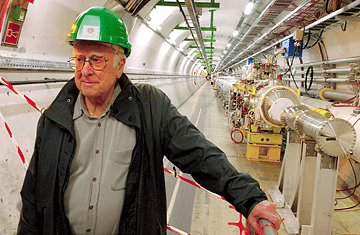Excitement builds ahead of Higgs boson MOOC
Prof Luigi Del Debbio, from the University of Edinburgh, discusses Peter Higgs, CERN, and the future of particle physics.

It’s been an incredible few months for my colleagues and I here at the University of Edinburgh, with so much interest in Peter Higgs, his work, and the ongoing research at CERN (European Organisation for Nuclear Research) in Switzerland, where the boson was discovered in July 2012.
Now, with the free online course ‘The discovery of the Higgs boson’ starting on FutureLearn.com next week, we are delighted to have the opportunity to share our knowledge with learners around the world.
Peter Higgs and Francois Englert were awarded the 2013 Nobel Prize for Physics for the theoretical work that is central in the construction of the Standard Model of particle physics. The Standard Model is an elegant framework that describes how elementary particles behave at the smallest distances explored so far with an unprecedented precision.
Peter’s work on the boson in the 1960s was truly ground-breaking, and I am glad to say that that tradition continues to this day at Edinburgh. My colleagues and I are at the forefront of new research in this field, with many of us having spent time at CERN, exchanging ideas with fellow academics from across the globe.
The Standard Model leaves many questions unanswered: it does not explain the value of its “fundamental” parameters, does not include a consistent theory of gravity, does not explain the observed neutrino oscillations, and does not provide an obvious candidate for dark matter. Is the Standard Model sufficient to explore and understand the extremes of the Universe? As we consolidate our understanding of the Standard Model, we will be looking for hints of new physics: current experiments may provide a first glimpse of the new laws that govern physical phenomena at even smaller scales.
It’s a fantastic time to be a particle physicist. Unveiling these new laws, and understanding their impact on the current unsolved mysteries, is the challenge for the new generations of physicists. The University of Edinburgh has established the Higgs Centre for Theoretical Physics in recognition of Peter Higgs’ work. The Centre builds on the legacy of the Mathematical Physics department established by Max Born – another Nobel Prize winner who worked at Edinburgh University – and on the variety of active research that is currently going on in Edinburgh in this area of science. It is our ambition to create an environment where scientists and students can come together and work towards establishing new scientific paradigms. Scientists from the Higgs Centre have pooled their knowledge to describe the physics of the Higgs boson in this MOOC.
So, what can students who sign up to this MOOC expect to learn?
- How to describe natural phenomena through fundamental laws;
- What are the constituents of the Standard Model, and the role of the Brout-Englert-Higgs mechanism?
- How we arrived at the discovery of the Higgs, its consequences for cosmology, and what physics may lie beyond the Standard Model.
With the LHC (Large Hadron Collider) restarting its operations in 2015, experiments at CERN will be able to probe higher energies than the ones explored so far, and new discoveries will trigger new theoretical ideas. We hope that this MOOC will help you in staying tuned with the latest discoveries and their impact on our knowledge of fundamental physics.




